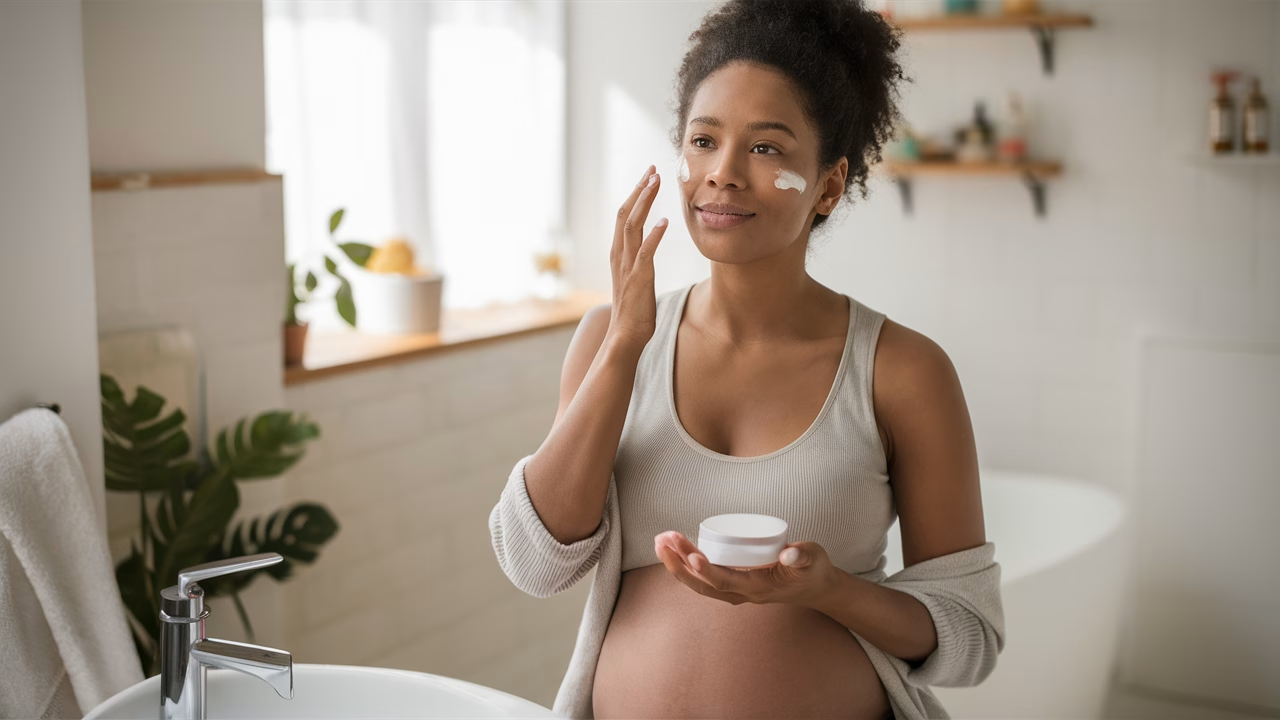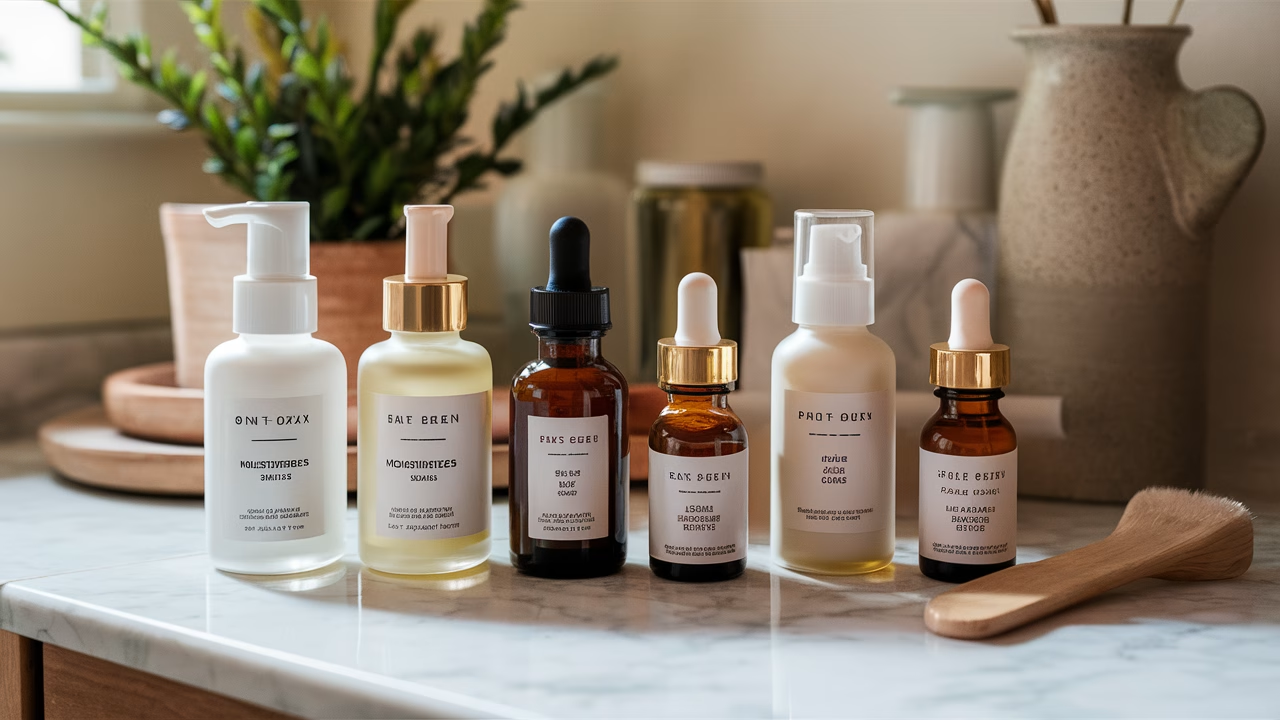What Is the Best Pregnancy-Safe Skincare Routine?
A pregnancy skincare routine protects your baby while preserving your natural glow. The best safe skincare during pregnancy avoids harmful ingredients, uses gentle skincare products for pregnant women, and adapts as your body changes. Let’s walk through exactly how to care for your skin during pregnancy—safely and beautifully.
TL;DR — Quick Tips for Pregnancy Skincare
- Avoid ingredients like retinoids, salicylic acid, and hydroquinone—these may pose risks during pregnancy.
- Choose gentle cleansers, hydrating serums, and non-toxic skincare options during pregnancy crafted for sensitive skin.
- Use mineral-based sunscreen (zinc oxide or titanium dioxide) every day to protect from increased sun sensitivity.
- Try natural remedies for pregnancy skin care concerns like aloe vera, honey masks, or oatmeal soaks to soothe inflammation or hormonal breakouts.
- Read labels carefully—just because a product says “natural” doesn’t mean it’s safe while pregnant.
Understanding Harmful Ingredients to Avoid
Ever flipped over a skincare bottle and struggled to pronounce what’s inside? During pregnancy, ingredient awareness becomes essential for safe skincare. Certain chemicals, especially those absorbed through the skin, can cross the placenta and potentially affect fetal development. Let’s decode the top culprits.
Ingredients You Should Definitely Skip
- Retinoids (Retinol, Retin-A, Tretinoin, Isotretinoin): These powerful anti-aging ingredients are linked to birth defects. Even topical forms carry risks.
- Salicylic Acid (High-Concentration): While very small topical amounts might be safe, high doses or peels should be avoided due to potential salicylate toxicity.
- Hydroquinone: Used for pigmentation, but with a high absorption rate and unclear fetal safety, this should be left out.
- Phthalates and Parabens: Found in synthetic fragrances and preservatives—both are endocrine disruptors that may interfere with hormone regulation.
- Formaldehyde: Occasionally found in nail products or hair smoothing treatments—it’s a known carcinogen and best skipped entirely while expecting.
What does this mean for you? It’s time to become a label detective. When in doubt, look for skincare specifically formulated as “pregnancy-safe” or consult your dermatologist about safe skincare practices.
Building a Gentle Skincare Regimen for Expectant Moms
Your pregnancy glow is real—but it often comes with pregnancy acne, dryness, or blotchiness thanks to hormonal shifts. Let’s break down a trimester-friendly routine that comforts your skin while keeping your baby safe.
Morning Routine
- Cleanse: Start with a sulfate-free, fragrance-free gentle cleanser.
- Tone (optional): Choose alcohol-free, soothing milky toners with oat or rosewater.
- Serum: Hydrating serums with hyaluronic acid, niacinamide, or vitamin C are safe and effective.
- Moisturizer: Stick to non-comedogenic, sensitive-skin-friendly options.
- Sunscreen: Always finish with a mineral sunscreen—zinc oxide or titanium dioxide only.
Night Routine
- Cleanse again: Remove makeup, dirt, and sunscreen buildup with gentle cleansers.
- Targeted serum: Use pregnancy-safe actives for concerns like dullness or pigmentation.
- Moisturize: Lock in hydration with shea butter or ceramide-based creams for overnight repair.
Here’s what often happens: You’ll notice increased dryness in the first trimester, some pregnancy acne flare-ups in the second, and potential melasma in the third. Adjust your pregnancy skincare routine accordingly while keeping consistency as your foundation.
Natural Remedies for Common Pregnancy Skin Concerns
Nature can be your gentle healer, especially when your skin reacts unpredictably. Here are some tried-and-true natural remedies for pregnancy skin care concerns that are safe, affordable, and soothing.
Puffy Eyes, Tired Skin?
- Cucumber slices over the eyes reduce swelling and promote natural glow.
- Cold green tea bags shrink puffiness and brighten dark circles.
Pregnancy Acne?
- Raw honey has antimicrobial properties—apply as a 15-minute mask for pregnancy acne treatment.
- Oatmeal paste mixed with Greek yogurt gently exfoliates and calms breakouts.
Skin Itching or Stretch Marks?
- Aloe vera gel soothes irritated skin instantly.
- Sweet almond oil or cocoa butter can improve stretch mark appearance over time.
Bonus: many of these double as self-care rituals. Taking a moment to pamper yourself with natural remedies can do wonders for your skin—and your mood.
Non-Toxic Beauty Products for Your Pregnancy Glow
“Natural” and “non-toxic” aren’t always the same. For safe skincare during pregnancy, non-toxic skincare options during pregnancy mean clean formulations without known irritants or endocrine disruptors. Look for these phrases on labels:
- Dermatologist-tested
- Fragrance-free or naturally scented
- Hypoallergenic
- Formulated for sensitive or pregnancy-safe skin
When possible, prioritize transparency—brands that disclose their full ingredient lists tend to be more trustworthy. In practice, your best bet is sticking to short, simple ingredient names you can actually recognize. Remember, less is often more when it comes to hormone-safe beauty products for expectant mothers.
Maintaining Healthy Skin Throughout Your Pregnancy
Your journey through pregnancy will likely change how your skin looks and feels. Here are some maintenance tips to help you navigate each phase with confidence using gentle skincare products for pregnant women.
- First Trimester: Hydration is key. Drink water and use gentle moisturizers to combat early dryness or dullness.
- Second Trimester: Address pregnancy acne or melasma early with safe actives like niacinamide and vitamin C. Stay consistent with SPF for maintaining natural glow.
- Third Trimester: Skin may feel tight or uncomfortable. Use richer creams or body balms to soothe stretching areas.
Cost Guide for Pregnancy-Safe Skincare
| Category | Low-End | Mid-Range | High-End |
|---|---|---|---|
| Cleanser | $8–$15 | $20–$30 | $35–$50 |
| Serum | $10–$25 | $30–$50 | $70–$100 |
| Moisturizer | $12–$20 | $25–$40 | $60–$90 |
| Sunscreen | $10–$15 | $20–$35 | $50–$75 |
Final Thoughts
Pregnancy is one of the most transformative seasons of life—physically, emotionally, hormonally. Nurturing your skin with a proper pregnancy skincare routine isn’t just an act of self-care, it’s a way to honor how powerful your body is right now. Whether dealing with melasma, dry patches, pregnancy acne, or just feeling unfamiliar in your skin, know this: with the right safe skincare practices, you can glow confidently and safely.
Be patient with your skin. Like your growing story, it’s evolving beautifully—one trimester at a time.
Frequently Asked Questions
Is hyaluronic acid safe during pregnancy?
Yes. Hyaluronic acid is naturally occurring in your body and is perfectly safe to use topically during pregnancy for hydration and plumping.
Can I use vitamin C serum while pregnant?
Yes, vitamin C is safe and can help brighten your skin and reduce hyperpigmentation associated with melasma.
What’s a good natural alternative to retinol?
Bakuchiol is a plant-based ingredient shown to have similar anti-aging effects to retinol, without the risks associated with retinoids during pregnancy.
How do I treat breakouts without harsh acne medication?
Use gentle cleansers, honey masks, niacinamide serums, and non-comedogenic moisturizers. Avoid over-cleansing or drying out your skin.
Are essential oils safe during pregnancy?
Some are, but many aren’t. Lavender and chamomile are generally safe in diluted forms, while clary sage and rosemary should be avoided. Always check with your doctor first.
Should I switch my skincare routine after giving birth?
Yes—postpartum skin may continue to fluctuate. You may reintroduce actives like retinol after breastfeeding is complete, based on your doctor’s guidance.


